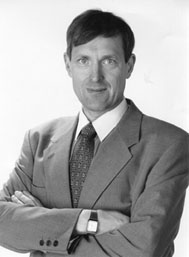Mr. Esko Seppänen, 53, Helsinki
Confederal Group of the European United
Left/Nordic Green Left, Member
Committee on Industry, External Trade, Research and Energy
(ITRE), Member
Committee on Budgets (COBU), Substitute
Delegation to the EU-Russia Parliamentary Committee,
Member
Delegation to the European Economic Area Joint Parliamentary
Committee (EEA), Member
Delegation to the EU-Estonia Joint Parliamentary Committee,
Substitute
European Parliament Delegation to the European Convention,
Substitute
Esko Seppänen has a Masters Degree from the
Helsinki School of Economics and Business Adminstration. Before
his political career, he worked for the Finnish Broadcasting
Company as a journalist specialised in economic affairs. In
1987, he was elected to the Finnish Parliament, and while
MP he also served as a Parliamentary Trustee in the Bank of
Finland. In Finland's EP elections of autumn 1996, he was
an alternative for those who voted "no" to membership
in the referendum. Currently as a re-elected MEP, his political
interests focus on the relationship between the federalisation
process of the European Union and the nation state.
ESKO SEPPÄNEN:
 In
general terms, I see the EU as a manifestation of global capitalism
implemented into a European framework. This capitalism has
no social dimension whatsoever, and is acting as an invisible
hand in a form of the so called faceless market forces. Moreover,
this capitalistic market force mechanism is only following
its own rational internal antisocial logic by converging towards
highest profits and lowest taxes. And the Eurocracy, the EU's
bureaucratic power-centre formed by EU-civilservants is only
enforcing this socially perverted neoliberalism by monitoring
and preventing the national states to set any obstacles to
the freedom of capital movements. In
general terms, I see the EU as a manifestation of global capitalism
implemented into a European framework. This capitalism has
no social dimension whatsoever, and is acting as an invisible
hand in a form of the so called faceless market forces. Moreover,
this capitalistic market force mechanism is only following
its own rational internal antisocial logic by converging towards
highest profits and lowest taxes. And the Eurocracy, the EU's
bureaucratic power-centre formed by EU-civilservants is only
enforcing this socially perverted neoliberalism by monitoring
and preventing the national states to set any obstacles to
the freedom of capital movements.
My main arguments against the EU are connected to two interrelated
issues: economic and military integration. Economic and Monetary
Union, as defined by the convergence criteria in the Maastricht
Treaty, does not enable an equal allocation of welfare between
different Member States.
I see the deepening of the EU common security and defence
policy. This military integration will definitely lead to
a common military union, which will in practice be NATO. From
Finland's perspective, NATO membership would have negative
economic as well as political consequences. Economically,
NATO membership would mean increasing our military spending,
thus constraining our budget policy freedom even more.
The most important aim for me in my work in the EP will be
setting up and participating in a European wide discussion
forum, which gathers people sharing the same vision of anti-federalist
Europe with full employment.
In the Parliament we have formed an intergroup called "SOS
Democracy" to defend the only known form of democracy:
national state democracy. The intergroup gathers MEPs from
all political groups in the Parliament and represents almost
all Member States. We have a common goal: saving the democracy
in the federalisation and militarisation process of the Union.
|